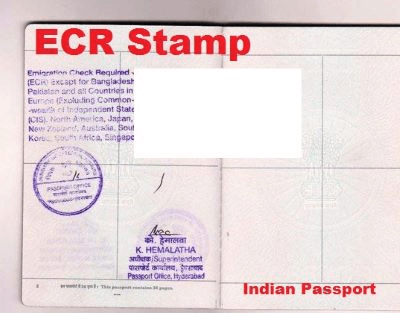ECR Full Form | What is Emigration Check Required
What is the full form of ECR
ECR: Emigration Check Required

ECR stands for Emigration Check Required. It is related to the type of passport. Your passport can be either ECR (Emigration Check Required) type or Non-ECR or ECNR (Emigration Check Not Required) type. It depends on the following two conditions:
- If a person who has applied for the passport does not provide his or her matriculation certificate, the case may be that he has not passed the 10th class (Matriculation), his or her passport will be of ECR types, or it will fall under ECR category, i.e., it will have a stamp of ECR.
- A person who has passed the 10th class (Matriculation) and provides his 10th class certificate for the passport, then his or her passport will be of Non-ECR or ECNR type. So, if you are 10th pass, by default you are eligible for ECNR category passport.
A passport that falls under ECR category will have listed it clearly with either a stamp or notation or full text ?EMIGRATION CHECK REQUIRED.? For passport before Jan 2007, it used to be a stamp, but for the latest passports, there may be a text written/endorsement in the address page of the passport. So if there is no ECR stamp in your passport, it means ECNR (Emigration Check not required).
How to check if ECR is required?
When you fill an Indian passport application form, you will come across a question, ?are you eligible for Non-ECR Category?? And you have to select ?Yes? or ?No.? if you have not passed 10th class or don?t have matriculation certificate to submit, you have to select ?NO.? Thus, your passport will be of Non-ECR or ECNR (Emigration Check Not Required) type.
thBottom line:
An ECR passport is issued to people who do not attach their 10th class mark sheet in their passport application form.
NON-ECR category passport is issued to those who attach the 10th or higher studies mark sheet in their passport.
What is Emigration?
When a person goes to a foreign country regarding employment, then it is called immigration, and the person is called emigrant.
If you are going to a foreign country for treatment, study, or as a tourist, but not for employment, the type of passport (ECR or NON-ECR) does not make any difference. But, if you are going for employment in any of the following eighteen countries, you have to take clearance from immigration counter if you have an ECR passport:
- United Arab Emirates (UAE)
- The Kingdom of Saudi Arabia (KSA)
- Qatar
- Oman
- Kuwait
- Bahrain
- Brunel
- Malaysia
- Jordan
- Sudan
- Yemen
- Libya
- Afghanistan
- Indonesia
- Lebanon
- Syria
- Thailand
- Iraq.
Purpose of ECR:
The ECR is introduced for the protection and welfare of Indian workers who are unskilled, uneducated, and thus are vulnerable to exploitation while working in a foreign country. So, Emigration check or clearance acts as a safety measure that ensures that people going abroad for employment will not be duped. Emigration clearance is granted after verifying offered salary, working terms and conditions of the employment. Furthermore, as per the Emigration Act 1983, the Ministry of Overseas Indian Affairs takes care of the emigration and return of the emigrants.